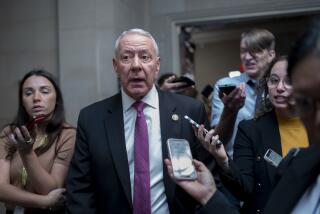Buchanan Is About to Bolt to Reform Party, Sources Say
- Share via
WASHINGTON — Abandoning his lifelong Republican heritage to don the mantle of insurgency, Patrick J. Buchanan is prepared to quit the GOP and seek the Reform Party nomination, sources said Wednesday. An announcement is expected within two weeks.
A Reform Party activist who has discussed the matter with Buchanan said the former Nixon and Reagan White House aide could change his mind. But the activist, who declined to be identified, said a reversal seems extremely unlikely.
Buchanan backers have been mailed an invitation to a “major announcement” Oct. 25 in Falls Church, Va., and the activist said he “expects there will be a lot of Reform members attending.”
Recently, Buchanan moved his presidential headquarters into expanded office space in the Washington suburbs, anticipating an influx of Reform Party volunteers once he leaves the GOP, according to a source familiar with Buchanan’s campaign operations.
A spokeswoman for Buchanan said Wednesday that no final decision has been made. The candidate himself has had no public events on his schedule this week.
Analysts give Buchanan, a peppery political commentator in recent years, next to no chance of winning the White House. Even winning the Reform Party nomination is no sure bet, especially after the recent flap over his isolationist views on World War II. An eclectic gallery of the famous and flamboyant has been talked about as potential contestants for the nomination, including New York developer Donald Trump, Minnesota Gov. Jesse Ventura--the party’s highest-ranking elected official--and billionaire Ross Perot, the Reform Party founder.
But if Buchanan were to secure the nomination--and the $12.6 million in election funds that go with it--he could have a significant effect on the outcome of the 2000 race. Most agree he would steal Republican votes, helping the Democratic nominee.
Buchanan’s candidacy would keep Texas Gov. George W. Bush, the GOP front-runner, “or any other Republican from running the kind of campaign they would otherwise run,” said Charles Cook, publisher of the nonpartisan Cook Political Report. “With an alternative out there for right-to-life and pro-gun conservatives, whoever runs as the Republican nominee will have to worry about securing the party base, rather than reaching for the middle.”
Buchanan sought the Republican presidential nomination in 1992 and 1996 and launched his latest GOP campaign early this year. But he began his flirtation with the Reform Party after finishing a disappointing fifth--out of nine candidates--in an August straw poll in Iowa. Since then, Buchanan has repeatedly lashed out against a nominating system he called “very closed and rigged” in Bush’s favor.
Campaigning last week in the governor’s home state, Buchanan said of Bush: “He’s a popular candidate and a likable fellow. [But] I don’t know that there is in his achievements any wisdom or any great knowledge that gives him a preemptive claim on the presidency of the United States.”
The Bush camp had no comment Wednesday on Buchanan’s evident decision. “We’ll see what he says,” said spokeswoman Mindy Tucker.
Bush has been criticized for urging Buchanan to stay in the party in light of his recent book questioning Adolf Hitler’s threat to America at the start of World War II.
Sen. John McCain of Arizona, another contestant for the GOP nod, was among those urging Buchanan’s exit because of the controversy. On Wednesday, he welcomed Buchanan’s expected departure: “As I have said all along, I believe that Pat Buchanan has already left the Republican Party. Today’s news comes as no surprise.”
Unlike 1992, when Perot briefly led the presidential field, there seems little hunger for an independent candidacy this year. A Gallup Poll released Wednesday showed Buchanan with 9% support against Bush and Democrat Al Gore, the vice president. Trump had 10% in a similar matchup.
Ted Jelen of the University of Nevada-Las Vegas predicted few Buchanan backers would defect to the Reform Party.
More to Read
Get the L.A. Times Politics newsletter
Deeply reported insights into legislation, politics and policy from Sacramento, Washington and beyond. In your inbox twice per week.
You may occasionally receive promotional content from the Los Angeles Times.











